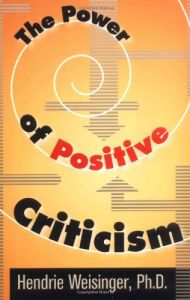Join getAbstract to access the summary!

Join getAbstract to access the summary!
Hendrie Davis Weisinger, Ph.D.
The Power of Positive Criticism
AMACOM, 2000
What's inside?
Like military intelligence, positive criticism is one valuable oxymoron.
Recommendation
Hendrie Davis Weisinger is simple, clear and very focused as he applies emotional intelligence techniques to the area of criticism and reframes criticism as a valuable, vital tool, and not just a necessary evil. The tips in this self-improvement book push the reader toward greater self-awareness, a major element of emotional intelligence. The suggestions are elemental: Most of them are easy to implement, and even the hardest ones to enact require only a modest time commitment. The book’s message is consistent to the point of repetition, though its simple language gives it real power. getAbstract recommends this book to anyone who gives or receives criticism, which is to say, everyone. In particular, if you are a manager, an executive and or supervisor who deals with difficult personalities, here’s how to tell them what you need them to know.
Summary
About the Author
Hendrie Weisinger, Ph.D., is a licensed psychologist and leading authority on emotional intelligence and anger management. He originated "Criticism Training" and led hundreds of seminars about criticism for Fortune 500 companies, government agencies and professional associations. He teaches in executive education and M.B.A. programs across the United States.

















Comment on this summary